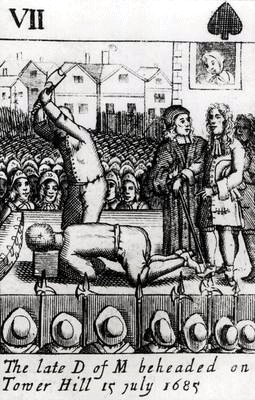Jack Ketch
Jack Ketch (died 1686) was an infamous English executioner employed by King Charles II. He became a well-known figure in the late 17th century, primarily due to his role in the execution of prominent figures of the time, as well as his reputation for botching several executions. Ketch's notoriety has made him a recurring character in English folklore and literature, often symbolizing the grim and brutal aspects of capital punishment.
Early Life[edit | edit source]
Little is known about Jack Ketch's early life, including his place or date of birth. Historical records first mention Ketch in the context of his profession as an executioner, a role he assumed around the mid-1660s. The lack of detailed records has led to much speculation and myth-making about his background.
Career[edit | edit source]
Jack Ketch's career as an executioner spanned over two decades during a tumultuous period in English history, which included the Restoration of the monarchy in 1660, the Great Plague of London, and the Great Fire of London. Ketch is most notorious for his role in the executions of prominent figures such as William Russell, Lord Russell, in 1683, and James Scott, 1st Duke of Monmouth, in 1685, following the Monmouth Rebellion.
The execution of the Duke of Monmouth is particularly infamous due to Ketch's failure to behead the Duke cleanly, requiring multiple blows to complete the execution. This event significantly tarnished Ketch's reputation, leading to public outrage and making him a figure of scorn and derision in popular culture at the time.
Legacy[edit | edit source]
Jack Ketch's name became synonymous with all executioners and, by extension, with death itself. He is frequently referenced in literature and popular culture, often as a symbol of the macabre and the injustices associated with the death penalty. His legacy is a complex blend of historical fact and folklore, making him a subject of fascination for historians and the public alike.
In Literature and Popular Culture[edit | edit source]
Ketch has been depicted in numerous works of literature and plays, often portrayed in a negative light. His name is used to evoke fear or disgust, reflecting his historical reputation. The character of Jack Ketch appears in various forms, from a grim executioner to a symbol of death or retribution.
Criticism and Controversy[edit | edit source]
Jack Ketch's career and legacy are subjects of criticism and controversy, particularly regarding his competence as an executioner and the cruelty of the executions he carried out. His failures in execution have been seen as reflective of the barbarity of capital punishment practices of the time.
Conclusion[edit | edit source]
Jack Ketch remains a figure of significant historical interest and cultural symbolism. His life and career offer a window into the practices of execution and the societal attitudes towards justice and punishment in 17th century England. Despite the negative aspects of his legacy, Ketch's story continues to captivate and provoke discussion on the ethics of capital punishment and the role of the executioner in society.
Search WikiMD
Ad.Tired of being Overweight? Try W8MD's physician weight loss program.
Semaglutide (Ozempic / Wegovy and Tirzepatide (Mounjaro / Zepbound) available.
Advertise on WikiMD
|
WikiMD's Wellness Encyclopedia |
| Let Food Be Thy Medicine Medicine Thy Food - Hippocrates |
Translate this page: - East Asian
中文,
日本,
한국어,
South Asian
हिन्दी,
தமிழ்,
తెలుగు,
Urdu,
ಕನ್ನಡ,
Southeast Asian
Indonesian,
Vietnamese,
Thai,
မြန်မာဘာသာ,
বাংলা
European
español,
Deutsch,
français,
Greek,
português do Brasil,
polski,
română,
русский,
Nederlands,
norsk,
svenska,
suomi,
Italian
Middle Eastern & African
عربى,
Turkish,
Persian,
Hebrew,
Afrikaans,
isiZulu,
Kiswahili,
Other
Bulgarian,
Hungarian,
Czech,
Swedish,
മലയാളം,
मराठी,
ਪੰਜਾਬੀ,
ગુજરાતી,
Portuguese,
Ukrainian
Medical Disclaimer: WikiMD is not a substitute for professional medical advice. The information on WikiMD is provided as an information resource only, may be incorrect, outdated or misleading, and is not to be used or relied on for any diagnostic or treatment purposes. Please consult your health care provider before making any healthcare decisions or for guidance about a specific medical condition. WikiMD expressly disclaims responsibility, and shall have no liability, for any damages, loss, injury, or liability whatsoever suffered as a result of your reliance on the information contained in this site. By visiting this site you agree to the foregoing terms and conditions, which may from time to time be changed or supplemented by WikiMD. If you do not agree to the foregoing terms and conditions, you should not enter or use this site. See full disclaimer.
Credits:Most images are courtesy of Wikimedia commons, and templates, categories Wikipedia, licensed under CC BY SA or similar.
Contributors: Prab R. Tumpati, MD

